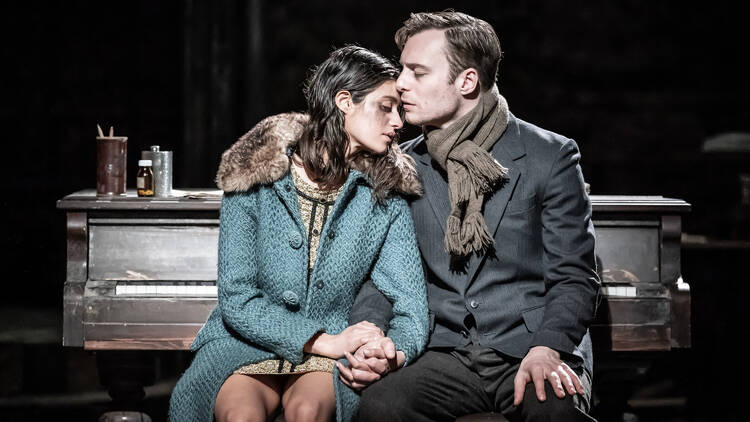Bricks from disintegrating walls cover the stage.
A hulking, black bull breathes it last.
An aging opera singer arrives in a nameless European city.
A narcissistic rent boy readies for a “date.”
An awkward student is newly single.
A taxi driver prepares to meet the son she walked out on years ago.
A stockbroker travels to an appointment to “take care of” some poor transactions.
The one-woman chorus reaches out to each of them.
Two cellists watch and accompany from the edge.
 Smash a mirror on the floor. Go on, do it. Now look at what remains. There are large chunks, long slivers and other bits that are so small they’re practically dust. Each one is uniquely sized and shaped. There is space in between them. Each one those sharp-edged, broken reflective pieces, no matter how large or small, is a person. Alone. Reflecting the world around them. With potential to fit into the pieces around us but. Just. Not. Doing it.
Smash a mirror on the floor. Go on, do it. Now look at what remains. There are large chunks, long slivers and other bits that are so small they’re practically dust. Each one is uniquely sized and shaped. There is space in between them. Each one those sharp-edged, broken reflective pieces, no matter how large or small, is a person. Alone. Reflecting the world around them. With potential to fit into the pieces around us but. Just. Not. Doing it.
Simon Stephens slingshots Bizet’s Carmen into a wall at a billion mph, creating an explosion of bricks, sparkly confetti, agony, death, black blood, desperation and loneliness. His magnum opus to date, Carmen Disruption is a mess, but one that gloriously mirrors modern life with painful accuracy. Amongst the rubble are characters who are also these broken bits of mirror, pointing at us, mirroring us and paralleling Bizet’s original cast. We are them. They are us. They/we are also the creation of the deteriorating mind of the Singer (Sharon Small), who endlessly travels the world performing the same role over and over, no longer seeing truth in real life but only when she is Her. Carmen. Everyone she sees reflects an archetype from the opera, and not just the characters. Us, too. We are the Stephens’ characters, they are us, two mirrors facing each other. Reflecting infinity.
The five characters all lead radically different lives, intersecting only by chance because of opera and a motorbike accident. They never speak to each other, only to us. Even when they meet their narration is to the audience, about the others. They have no direct contact with anyone other than the observational Chorus (Viktoria Vizin). Fractured monologues weave in and out of each other, building their world that could be any major city, anywhere in the world. Fireflies blinking in the night sky. Their contact with the world filters through mobile phones, a comment on our dependence on our gadgets and urge to document rather than experience. If we take on the role of recorder, we don’t have to engage. Did technology cause the detachment from each other? This question is posed, but never answered, but not a major plot element anyway. By being posed, it makes a statement, calling on us to examine ourselves and our society in which we exist as lonely fragments of a shattered mirror.
Confrontational and omnipresent throughout the stories arising from our characters’ episodic speeches is the dark, hulking carcass of a bull. Its eventual movement surprises, showing a dying struggle rather than death. The actors pick their way around it as the audience did when they entered from the foyer, surprised and disorientated. A creeping pool of black blood eventually consumes. It is a striking visual, the elephant in the room, highlighting the destruction towards which we all hurtle.
The cellists are also fragments, as is their music. An LED surtitle screen adds an operatic element with sporadic, sarcastic content. None of the characters are particularly likeable, instead they evoke pity or disdain. The only thing that brings them together is a terrible accident they witness, but even then they only manage to bounce off of each other and continue spinning into the darkness. Alone. All roles are impeccably performed and the actors engage with each other in the space even without direct interaction.
It doesn’t matter if you know the story of Carmen or not before seeing this production. I don’t know it well at all and may have taken unintended meaning from Stephens’ script, but its ability to communicate Important Messages without having Bizet’s frame of reference attests to Stephens’ skill and the script’s excellence. Every individual will find different aspects of the production incredible and abhorrent, depending on their own frame of reference. John Light’s stockbroker, Escamillo, disgusts me. I am horrified by rent boy Carmen’s (Jack Farthing) details of his rape. I feel sorry for the naïve student (Katie West) who sexts her 63-year-old married lecturer boyfriend and believes their relationship has any love. Or meaning.
I could watch these characters forever. Not having an interval was certainly the right choice for this play. The compact snippets from their lives allude to distinct pasts and futures. Even though the world they inhabit is nameless and featureless, they were flawed, beautiful, unique humans. Smash another mirror. Go on, do it. Each individual fragment is totally unique, unlike those from our previous mirror. Future broken mirrors will be unique as well. Despite the presence of archetypes, the microscopic details of their stories are unrepeatable. On what trajectory would they all continue? I need to know. If Simon Stephens were to make a Synechdoche, New York version of Carmen Disruption, I would happily live in it. Forever.
Though director Michael Longhurst’s creative choices challenge perceptions of contemporary British drama, he could have emphasized the interaction and audience engagement even further. Even though the Almeida is known for its cutting edge work, this is a piece that could have been more fully explored in a large studio setting, without the constraints of a balcony and distinct actor/audience boundaries. I wanted to dance with these characters. I wanted them to move around me. I wanted them to look me directly in the eyes as they relayed their journeying tales and not have any regard for personal space. Carmen Disruption is aggressive, bold and visceral, the sort that is supported by more audience immersion rather than less. At the very least, the audience could have been lit so the actors could see their/our eyes, allowing a connection I craved and they characters clearly yearned for.
Despite this, the effect created was a Brechtian one of alienation and motivation to action. It’s no coincidence that Stephens’ work is popular in Germany. As I picked my way along Friday night’s Upper Street towards the tube station, the stories of those passing by and enjoying their warm, social evenings exploded around me like fireworks. I felt the need to connect. Never has the loneliness of modern life been so starkly emphasized on stage, and afterwards carried through the dark night.
The Play’s The Thing UK is an independent theatre criticism website maintained voluntarily. Whilst donations are never expected, they are hugely appreciated and will enable more time to be spent reviewing theatre productions of all sizes. Click here to make a donation with PalPal.



